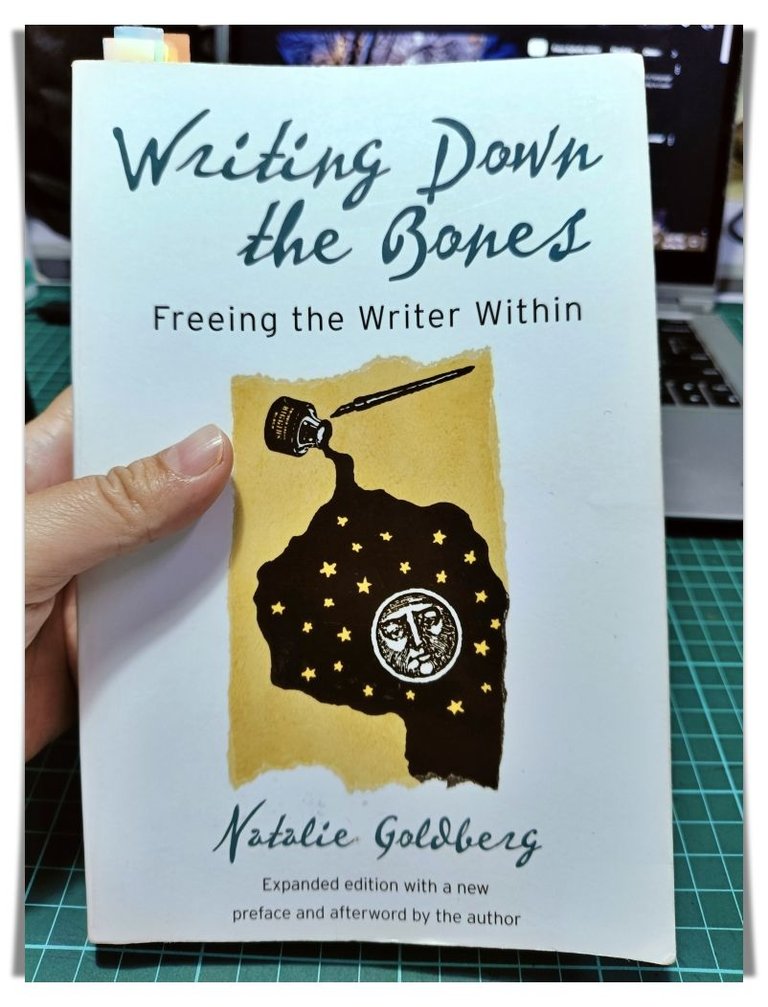
Natalie Goldberg's Writing Down the Bones: Freeing the Writer Within is more than just a book about writing; it is also an invitation to connect deeply with oneself and the world through language. For a novice writer such as myself, Goldberg's insights serve as a guiding light that illuminates the complex journey of creativity. Instead of focusing on technicalities, she embraces the honesty and rawness that make writing a process of self-discovery and transformation.
Each short essay in the book offers helpful advice and philosophical insights. Goldberg's tone is kind but forceful, encouraging writers to let go of perfectionism and self-doubt. She demystifies the act of writing, asking readers to just show up and trust the process. Goldberg emphasizes the importance of having a "wild mind" and the humble practice of timed writing sessions. She reminds us that writing isn't about making perfect masterpieces but rather about just sitting down with a pen and paper and seeing what comes out of it.
Among the numerous highlights of this book, the chapter "Going Home" deeply resonated with me. Goldberg explores the concept of returning to one's roots, both literally and metaphorically, as a means of deepening one's writing. She emphasizes the value of embracing one's personal history and cultural identity in order to create honest and resonant work.
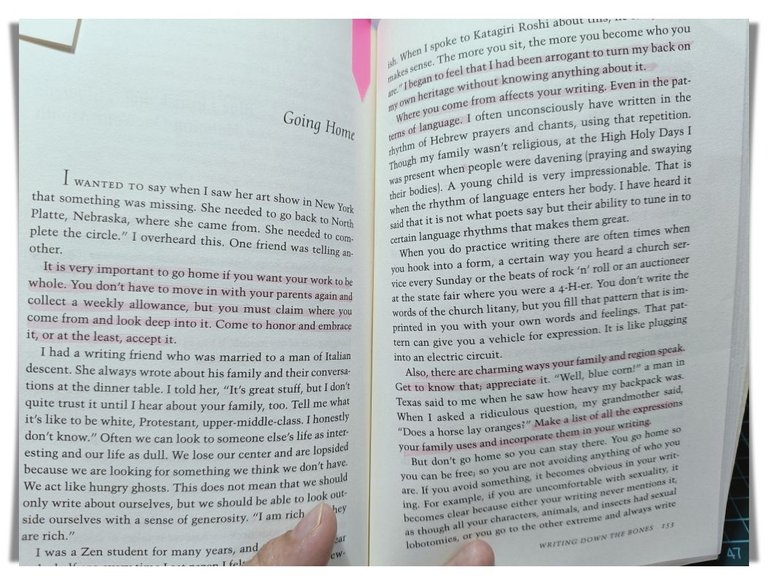
This chapter connects strongly with my personal experience as an Iban writer. Growing up in Sarawak, Borneo, I felt a strong connection to my cultural heritage. However, as life progressed and I moved away from my homeland, a sense of separation grew. Reading Goldberg's words felt like a call to action or a reminder that my ancestors' stories, our rich Iban cosmology, and the spiritual bond my people share with nature are all treasures waiting to be woven into my writing.
Goldberg's concept of "going home" involves not only revisiting physical locations but also exploring the emotional landscapes of memory and identity. She writes,
"So go home. Not so you can boast, "My uncle was a colonel in World War 2," but so you can penetrate quietly and clearly into your own people and from that begin to understand all people and their struggles."
The sentence resonated deeply with me, bringing back childhood memories of longhouse visits, riverbank celebrations, and the Gawai Dayak or Gawai Antu festivals. These are not merely remnants of my history but actual, breathing parts of my identity.
In the chapter, Goldberg emphasizes the need for specificity. She recommends writers delve into the specifics of their lives, such as making a note of all the expressions your family uses and incorporating them into your writing, or your religious upbringing, or if your parents were farmers, writing about farming. For me, this represents both a challenge and an opportunity. As an Iban writer who writes in English, which is not my first language, expressing these vivid details might be difficult. However, Goldberg's encouragement to trust my voice, no matter how imperfect, has given me the courage to try.
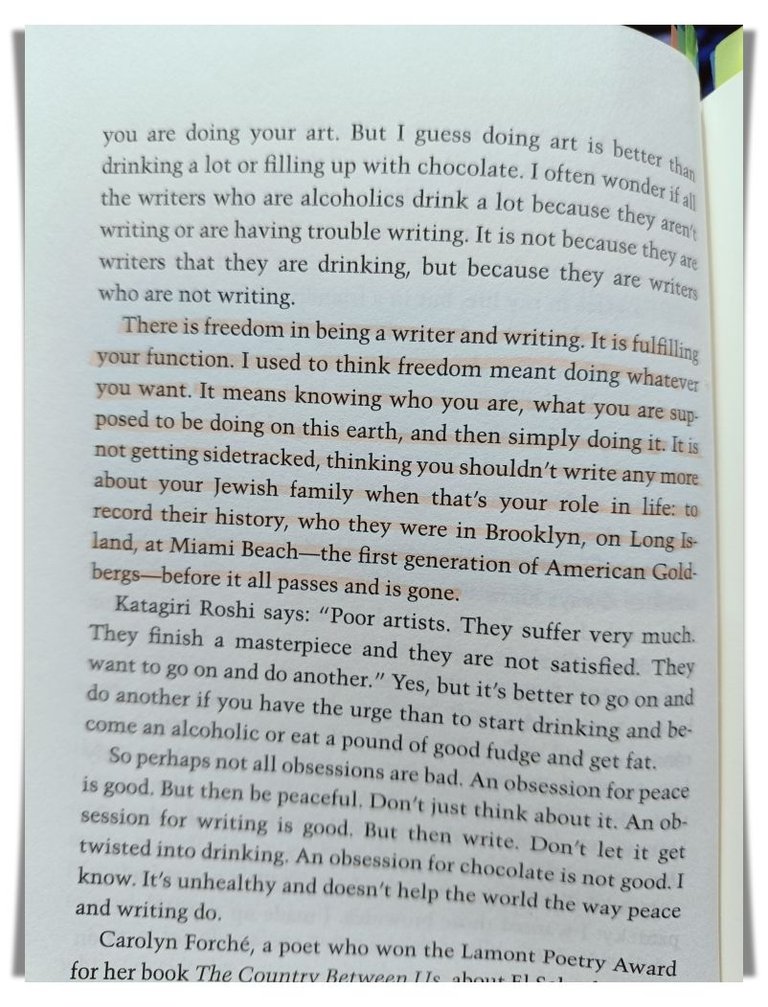
The chapter also emphasizes the universality of cultural exploration. Goldberg's anecdotes on her Jewish upbringing remind me that all writers, no matter their background, bear the weight and beauty of their culture. Her views inspire me to embrace my identity as an Iban writer and to enjoy my distinct perspective while still finding common ground with others. Writing about the Iban connection to the spiritual realm, for example, allows me to convey not just my personal tale but also an aspect of humanity's shared narrative.
Goldberg's suggestion to return to one's roots has practical applications as well. She urges writers to physically return to memorable places and allow the sights, sounds, and smells to inspire their work. For me, this means returning to my longhouse, Stambak Ulu, or Ng. Batang, and reconnecting with its timeless surroundings. It entails sitting by the river, listening for the flow of its waters, and allowing that experience to direct my pen. By doing so, I can imbue my writing with the truthfulness and depth that only comes from personal experience.
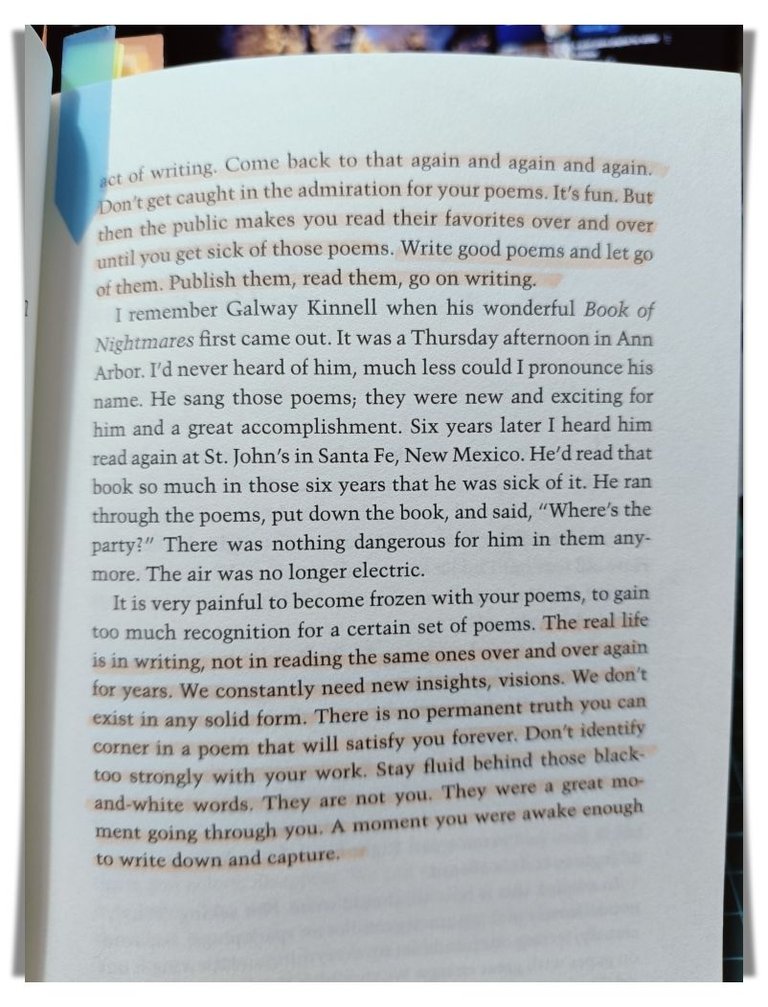
One of the most liberating lessons from Writing Down the Bones is the ability to accept imperfection. Goldberg contends that writing does not have to be polished or profound; it simply has to be honest. She writes,
"Let go of everything when you write, and try a simple beginning with simple words to express what you have inside. It won't begin smoothly. Allow yourself to be awkward. You are stripping yourself. You are exposing your life, not how your ego would like to see you represented, but how you are as a human being."
This is consistent with my journey of examining my cultural identity through poems and articles. My drafts may be sloppy and my analogies clumsy, but they are mine. My recollections and dreams nurture them, planting them in the soil of my childhood.
Another key takeaway from Writing Down the Bones is Goldberg's emphasis on vulnerability. She elaborates,
"Our task is to say a holy yes to the real things of our life as they exist—the real truth of who we are: several pounds overweight..."
This resonated deeply with me. As a Christian, I am often hesitant to speak candidly about things that may be considered controversial or unspiritual. Goldberg's remarks remind me that writing is about revealing one's truth rather than seeking acceptance. By accepting vulnerability, I can produce work that resonates on a deeper level with both myself and my audience.
As I completed the final chapters of Writing Down the Bones, I felt a newfound sense of purpose. Goldberg's insights have motivated me not only to write more but also to write with intention, using my words to connect my past and present, my culture, and the larger world. The chapter "Going Home" has given me the courage to embrace my Iban ancestry, to cherish its richness, and to share it with others.
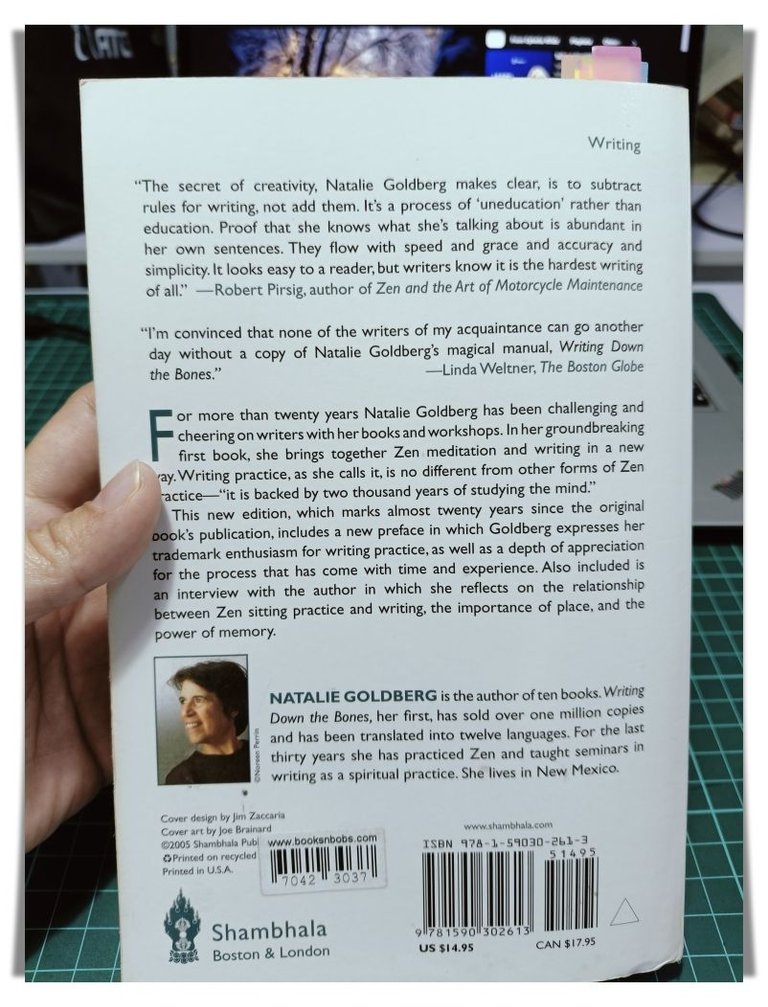
Natalie Goldberg's Writing Down the Bones is a gift for everybody who has ever felt compelled to write. It's a book that reminds us that writing is more than just creating; it's also about becoming. Goldberg, with her wisdom and love, invites us to sit down, pick up our pens, and begin the beautiful, messy, and transformational journey of writing. This journey includes returning to my roots, memories, and identity as an Iban writer. And I am genuinely humbled and grateful.
Note: Here's another review of a book about writing - Book Review | The Courage to Write - How Writers Transcend Fear by Ralph Keyes
That's it for now. If you read this far, thank you. I appreciate it so much! Kindly give me a follow if you like my content. I mostly write about making art, writing, life musings, and our mundane yet charming family life here in Klang Valley, Malaysia.
Note: All images used belong to me unless stated otherwise.

The focus on vulnerability and acceptance of imperfection in the writing process is such a valuable lesson. It's true that honesty is what matters most in what we write, and it seems like you've found that path in your own writing.
It takes a lot of courage to achieve that and in my case, there's still a very long way to go. There are many things I dare not write about.
This book is a very good example. I got enlightenment from the review you wrote about the 'purpose' itself.
Yes, this book is perfect for those pursuing writing as a career or for leisure.